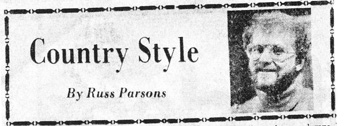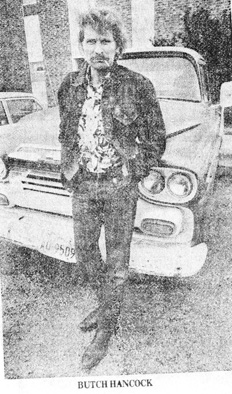Fire in the Water, Earth in the Air: Legends
of West Texas Music
by Christopher Oglesby
Published by the University
of Texas Press:
"As a whole, the interviews create
a portrait not only of Lubbock's musicians and artists, but also
of the musical community that has sustained them, including venues
such as the legendary Cotton Club and the original Stubb's Barbecue.
This kaleidoscopic portrait of the West Texas music scene gets
to the heart of what it takes to create art in an isolated, often
inhospitable environment. As Oglesby says, "Necessity is
the mother of creation. Lubbock needed beauty, poetry, humor,
and it needed to get up and shake its communal ass a bit or go
mad from loneliness and boredom; so Lubbock created the amazing
likes of Jimmie Dale Gilmore, Butch Hancock, Terry Allen, and
Joe Ely."
"Indeed, Oglesby's introduction of more
than two dozen musicians who called Lubbock home should be required
reading not only for music fans, but for Lubbock residents and
anyone thinking about moving here. On these pages, music becomes
a part of Lubbock's living history."
- William Kerns, Lubbock Avalanche Journal
|
Country Style was an entertainment column
written by Russ Parsons for the Lubbock Avalanche Journal in
the 1980s, a fertile time in Lubbock music history. He has graciously
shared many of his articles with us at www.virtualubbock.com
for our readers' enjoyment.
Russ Parsons currently is the food editor for the Los Angeles
Times.

LUBBOCK AVALANCHE JOURNAL
(posted on www.virtualubbock.com by
permission of author)
"A fellow walked up to me and said 'How
is it you can walk down the street and get a fantastic song and
I can fly around the world and not get a line worth singing?"
I told him, "Some people can walk around the block and see
everything, some people can fly around the world and not see
anything.'"
-- Tom T. Hall, as recalled by Butch Hancock
Wiry and rumpled with frazzled hair and a cowpoke's face,
Butch Hancock
looks like he stepped off the pages of a farm journal straight
from an Ace Reid cartoon.
Until you look closely, that is. Then you notice the steel-blue
eyes that seem to be looking through you. Not behind you, but
inside you. Hancock is a very intense man.
 In
conversation, two of his favorite words are "energy"
and "schemes," and it's unbelievable how many of each
he has. In
conversation, two of his favorite words are "energy"
and "schemes," and it's unbelievable how many of each
he has.
He is a songwriter. He is a performer. He is a recording artist
who supervises each and every step in the making of his albums,
from hiring the musicians, to trucking the records around in
his van to distribute them. He's an architect. He's a tractor
driver. He's a photographer and a popular Austin poster maker.
He has written many of Joe
Ely's strongest songs, including the memorable (and contrasting)
"Boxcars'' and "If You W ere A Bluebird." Jerry
Jeff Walker has recorded
two more of his songs (songs that Ely also recorded): "Sucking
a Big Bottle of Gin'' and "Standing at a Big Hotel."
His first album, "West Texas Waltzes and Dust-Blown Tractor
Tunes," was recorded in Ely's living room. His new one,
a double-set called "The Wind's Dominion," was produced
at Caldwell Studios and is due out the second week of December.
"It was recorded in a pure cyclone of energy or something
like it," Hancock said of the activity surrounding the double
LP. "It was pretty fast and curious and there were a lot
of good folks working on it."
The idea of somebody without a recording contract with a major
company putting out an album is novel, at least. But a double
album?
"I did that probably because all the songs relate to the
whole scheme of the album," he explained. "That title
cut, 'The Wind's Dominion,' is the scheme. Everywhere the wind
goes, chasing in and out, getting run around by it too. All the
songs have a pretty peculiar twist to them, it's a dimension
or two removed from the West Texas album. I get into a lot of
different areas of images rather than just West Texas. Really,
just two of the songs relate specifically to West Texas, the
rest of them relate in ways that are more into the psychology
of living in 'Modren (sic) America.'
"I've got schemes for I don't know how many albums,'' he
said."Part of the reason (for doing the double album) was
I've got so durned many going that I'm going to have to start
doing my albums two at a time to catch up with them. The next
one is going to be one I dreamed about five years ago. In the
dream it was the third album I'd done, so I'll stick with that.
I trust a lot of my dreams and that was one I had real strong
feelings about."
Undoubtedly the chairmen of the board at MCA, RCA and other music
conglomerates have other methods, but this is Butch Hancock,
and he seems to be traveling it a different direction.
"The idea of ideals is just not where I'm at." Hancock
said. "The point is that most of the time it's not the situation
or the accomplishment you want. That kind of ideal is so empty.
It's the quality of the experience. That's not a matter of necessarily
whether you're living up to those kind of situation goals like
earning lots of money or recording 20 albums. They can mean so
many different things from one moment to the next. Even when
you have them right in hand.
"I try not to pin myself down to saying, 'Hey, that's my
primary drive.' It may be for one night. Or it may be for one
week or a month or a year, but it's subject to real hard change.
Something else could come up so easily that I feel it's real
important to me to at least open myself to things, because that's
the thing that feeds the whole creative process."
One thing that feeds Hancock's creative process is those dreams.
One song on his new album, "Once Followed by the Wind,"
came from a dream.
"I was sitting in this small room," Hancock remembered.
"There was a fella in there, kind of bald-headed with big
thick glasses on. What he was known for was that by telepathy,
he could tell where any airplane was on earth. If you could tell
him the flight number or describe the flight to him, he could
tell you everything you needed to know about it. So I asked him
about some flight.
"He said, 'Oh yes, that's right over Floydada right now,
coming in to Lubbock.' " I said, 'Hey, that's pretty good,'
then right about that time in the dream I had little flash about
what the airplane looked like and I said, 'Is there any way you
can show me a picture of what that airplane looked like?' I just
want to check something out.'
"He said, 'Oh, just a minute.' Then he pulled out this box
and flipped through these cards. They looked like the box tops
to those model airplane kits you used buy. Each one had a different
airplane on it. Well, he pulled one out and, sure enough, it
was the airplane I had seen.
"He said, Hmmm, just a minute I've got something I want
you to listen to.' It was this old rickety tape recorder and
it was Jimmie
Gilmore singing this song "Once Followed by the Wind.'
He had this funky little strange band behind him that sounded
like rubber bands stretched across cigar boxes. It was a very
curious sound, ' such a beautiful melody. I woke up almost crying.
You know, that misty-eyed feel you get sometimes out of dreams,
then I suddenly realized, 'Gah, I've got to back in that dream.'
It took me about two or three minutes, but when I got back into
the dream again, there was the guy sitting there with his arms
folded.
"He said, 'Well. how'd you like it?' It was all over.
"I said, 'Oh now, well, something happened. I wasn't paying
attention. Is there anyway I could hear that again'."
"He said, 'Yeah, OK,' So he rewound it on the tape recorder
- this is all in the dream you know. I sat there and waited while
he rewound it and re-threaded tape. He replayed it and I got
the song down of it…..
[remaining article illegible?]
More articles by Russ Parsons
Joe Ely, Buddy Holly & Joey Allen - Jimmie Gilmore - David Halley - Larry Welborn
or
Return to Home
|




